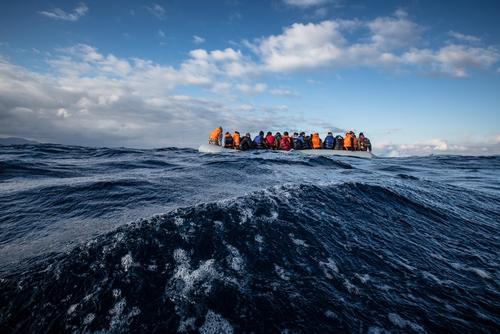Public letter from the UK medical community on the dangerous health consequences of Rwanda expulsions
As representatives of leading medical bodies in the UK, we are horrified by the Government’s plans to forcibly deport people seeking asylum in the UK to Rwanda with no possibility for them to return to the UK with refugee status. These plans will have a severe and irreparable impact on people’s health, wellbeing and dignity. We oppose this policy on medical, ethical and humanitarian grounds.
Whilst Priti Patel’s plans – modelled closely on the failed Australian system - have generated widespread condemnation on legal and practical grounds, there has been little focus on the catastrophic and irreversible harm they will have on the physical and mental health of individuals forcibly expelled.
We have seen the disastrous medical consequences of Australia's offshore detention policy on people who needed protection. We can attest that it is unconscionable for the UK government to knowingly replicate this cruel system of forced removals and offshoring to Rwanda - or any other country - as it results in harm and abuse. harm is done.
Australia has implemented a policy of forced removal and indefinite offshore detention on Manus Island and Nauru since 2012. This resulted in profound and well-documented systemic abuse, inhuman treatment and harm to the physical and mental health of men, women and children - suffering that was obscured from scrutiny.
The policy catalysed a mental health epidemic amongst those seeking safety, with UNHCR finding cumulative rates of depression, anxiety and PTSD among refugees forcibly transferred to Manus and Nauru to be the highest recorded in the medical literature to date, at over 80 percent in both locations.
Médecins Sans Frontières / Doctors Without Borders (MSF) provided mental health care to 208 refugees and asylum-seekers detained on Nauru Island. Of those, 60 percent had suicidal thoughts and 30 percent had attempted suicide.
Despite the horrendous migration journeys MSF’s patients had experienced, it was the indefinite nature of their detention that had the greatest mental impact.
The profound sense of hopelessness, fear for the future and enforced family separation, including from pregnant women and children, were among the factors that led to the collapse of people’s mental health.
Several weeks ago, the government revealed that families with children will be eligible to be forcibly removed to Rwanda – only unaccompanied children are spared from this fate. We know that this will have a severe impact on children's mental health and development.

Tell the UK Government to protect the rights of refugees
Between 2017 and 2018, MSF diagnosed 10 children on Nauru Island with Resignation Syndrome, a rare psychiatric condition where patients enter a comatose state to escape an unbearable reality and need medical treatment to keep them alive.
Children as young as nine were found to have suicidal thoughts, committed acts of self-harm or attempted suicide. In 2016, a leaked cache of more than 2,000 incident reports from the Nauru detention centre (2013 – 2015) included seven reports of sexual assault, 59 reports of assault, 30 of self-harm and 159 of threatened self-harm involving children.
We have severe concerns that those forcibly deported to Rwanda will struggle to access appropriate and timely healthcare. Australia’s offshoring policy has led to wide-scale neglect and several people died due to a lack of access to appropriate, quality and timely medical and psychiatric treatment.
Due to deteriorating health, unsanitary living conditions and health emergencies, medical evacuations to Australia became commonplace, with more than 1,200 people evacuated to receive medical care unavailable on the island. Will the same things happen to those forcibly deported to Rwanda?
Furthermore, many people seeking safety who arrive in the UK have survived torture, sexual violence and trafficking; almost everyone will have had traumatising journeys to reach the UK.
They should receive specialised care and support in the UK. They should not be expelled to another country, where they are likely to experience further traumatisation and their physical and mental health needs will not be met.
The UK government has consistently failed to ensure people seeking safety and accommodated in the UK have access to appropriate, timely and quality healthcare, and should be improving conditions for asylum-seekers in the UK, rather than sending them where their access to healthcare cannot be guaranteed.
We have a duty to give a fair hearing in the UK to those seeking sanctuary and ensure they are safe and able to access quality and timely healthcare and other vital services. This should not be outsourced to another country – these are people’s lives and futures and should not be traded or threatened.
The government says the objective of the policy is to save lives, but a plethora of data, testimony and evidence from the Australian model proves it will only endanger them. We are fundamentally opposed on ethical and medical grounds to forcibly deporting people to Rwanda – or any other place outside of the UK - and urge the British Government to abandon its plan before any further harm is done.
Signed,
British Medical Association – Dr John Chisholm, Deputy Chair, BMA Medical Ethics Committee
Faculty of Public Health – Professor Maggie Rae, President
Royal College of Midwives – Gill Walton
Royal College of Obstetrics and Gynaecology
MSF UK – Vickie Hawkins, Executive Director
Doctors of the World UK – Ellen Waters, Director of Development
Helen Bamber Foundation – Kerry Smith, Chief Executive Officer
Freedom from Torture – Dr Katy Robjant, National Director of Clinical Services
Medical Justice – Emma Ginn, Director